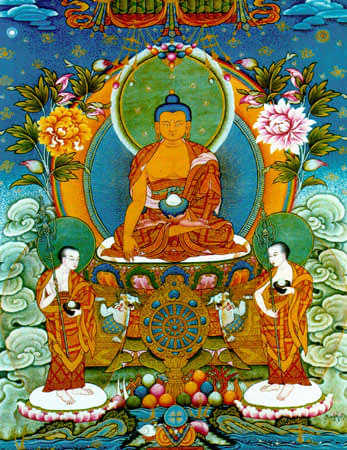Library - Tengyur - Comments on tantras

cintāmaṇi-tārā-nāma-sādhana
Chintamani Tara practice
I prostrate before the holy noble Tara!
“Wish Fulfillment Jewel” forms an increase in longevity, wealth, also all desires are realized! I bow before Tara!
I will record the practice. Through the stage explained earlier, see the nature of your own mind as the syllable tāṁ, which is like purified gold in color. Having realized the emission and gathering of rays of light, [it] becomes perfect. Imagine that from it [arises] the jewel marked with the syllable tāṁ.
There again the light is emitted and collected. After the transformation, I [appear] as Tara, that color like purified gold. With one countenance and two hands. Sitting on a lotus and the Sun with feet that are arranged in a posture of playful dance. Possesses ornaments of various jewels. With his right hand holds a jewel vertically on his thigh. With her left hand she holds a branch of the wish fulfillment tree with her back resting on it. In her heart, visualize the jewel marked with the syllable hūṁ.
Through the emission of light from the attributes and the seed-syllable-the suffering of poverty of all living beings is eliminated. Through returning back, the body proper [as deity] is clearly manifested. Again light is emitted from the heart. By this the jnanasattva is introduced and the possession of initiation is realized, [which is shown by being] sealed by Ratnasambhava.
Like [shown] before, light is emitted and gathered. By this the [visualization] of the body is clarified. Thus meditate until [attaining] steadfastness.
If unrest arises, recite. By the light that is emitted from one's own syllable-seed and mantra, the flow [of mind] of all the Tathagatas is induced. Visualize the rain of all desirable qualities, such as grains, jewels, etc., falling down. Say at the same time:
oṁ tāre tuttāre ture cinta maṇi dhara bhya vira bhya svāhā
[Repent] of defects after that, send the jñānasattva. Make samajñāsattva invisible. Offer up virtue.
Thus concludes the practice of Chintamāni-Tara, compiled by the siddha-acquiring acharya Bhāvabhāta.
Translated into Russian by Lama Karma Paljor (O.E. Filippov).


